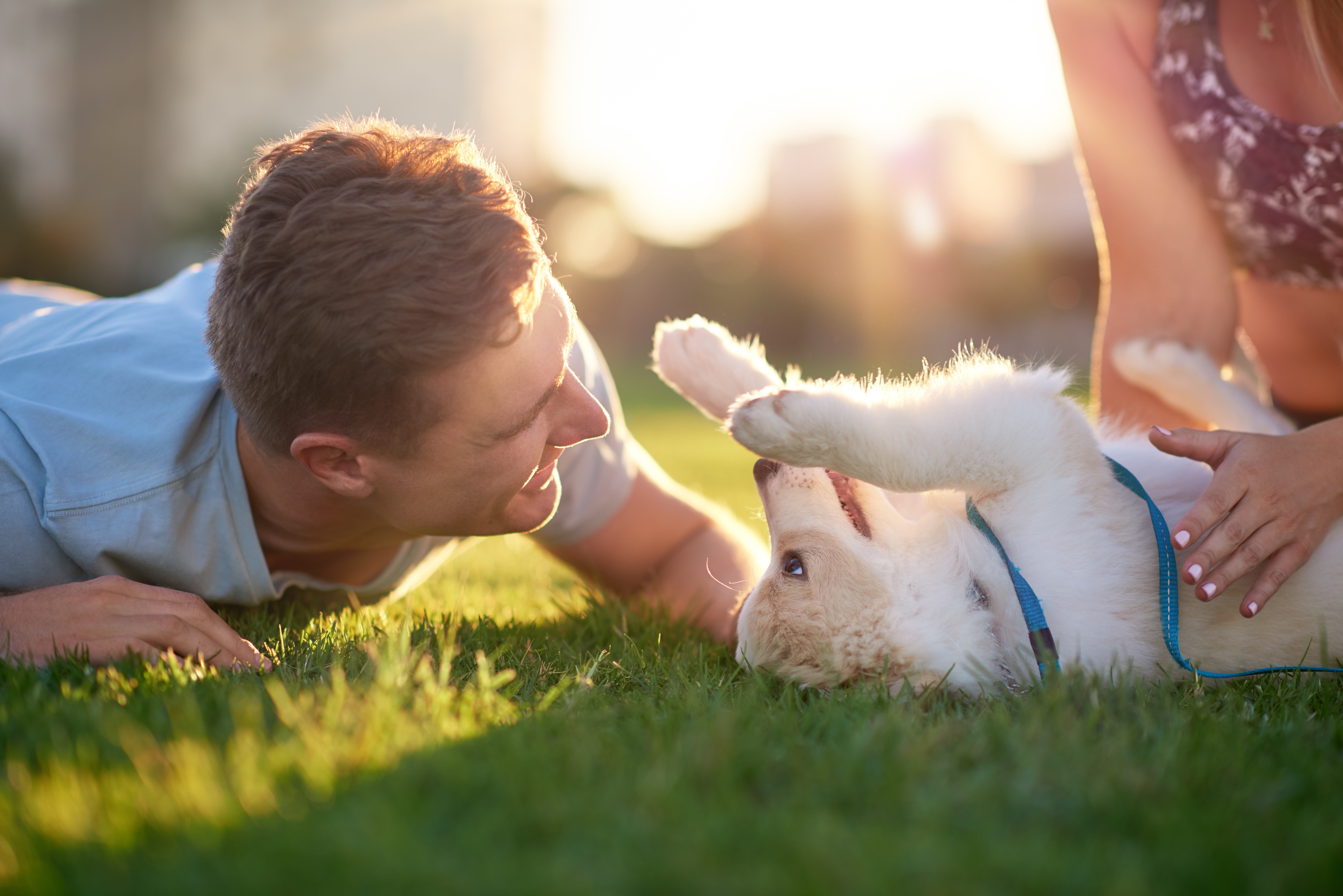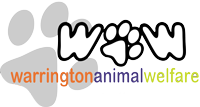
Warrington Animal Welfare Advice for Settling in a New Puppy
Congratulations on being the proud owner of a new puppy. We would like to give you some basic advice on settling in and bringing up a puppy. There are no hard and fast rules but we hope that the following information will help.
The first few days of Puppy Ownership
For a young puppy, leaving the rescue centre and arriving in a new home can be a traumatic time. The puppy does not know what is happening to it. This is probably the first time the puppy has been away from its familiar surroundings and possibly also the first time he has been separated from his litter-mates.
When you arrive home with a puppy, allow him to have a good look around his new home. It is important that the puppy is allowed to do this with minimal interruptions. If you have children, please encourage them to give the puppy some space.
Give the puppy somewhere of his own, somewhere where he can feel secure and peaceful. Use a basket, indoor kennel or a nice quiet corner in the warm. Leave an item of your clothing with your smell on it, an old soft toy and a clock with aloud ‘tick’. All of these things will help the puppy feel secure.
Do not spend every minute of the day with the puppy and then expect him to stay quietly on his own at night. From the first hour you get home, put the pup into a room alone with just his basket for 5 minutes and then do the same the next hour for slightly longer. By doing this the puppy will understand that when you leave it at night, he is not being abandoned. If the puppy does not settle at night, you may just have to succumb and allow the puppy to sleep next to your bed, or alternatively you could sleep downstairs with the puppy.
House training your Puppy
-
Please remember, your young puppy has no idea about house training. It is up to you to teach it.
-
Never tell your puppy off from messing in the home. If you do you, you will make him anxious and he will mess more and more out of fear and confusion.
-
Never, ever rub his nose in the mess: this is cruel and will not solve the problems.
-
Only if you catch the puppy actually doing its mess should you scold him. Say “no” and quickly put him outside.
-
Praise is the key to successful house training, so praise him hugely whenever he does the right thing.
Most puppies need to relieve themselves after a meal, after sleep and after a game. You will soon get to know the pattern. They often provide useful clues to warn you - such as adopting a “special walk” just before messing.
Every dog is different. Some grasp the idea of house-training quickly, some more slowly.
Never lose your patience with your puppy as this can not only distress him, but also will also cause him to lose confidence.
Children around a Puppy
Having a new young puppy in the home is an exciting time for children. The relationship your children form will last for many years, providing happy moments and memories that will last a lifetime.
-
Ensure your children give the new puppy a chance to settle in.
-
Encourage them to play the game "who can ignore the puppy the longest" during the first few weeks.
-
It is important that the children are not allowed to smother the new puppy i.e. hugging it around its neck, kissing its face and generally getting "too close".
-
Do not to allow the puppy to lick around their mouths or faces.
-
Never allow children to pick up the puppy. Encourage them instead to sit with a puppy on the floor with the puppy on their lap.
-
Be careful with visiting children as they may never have been taught how to behave around animals.
-
Do not allow your children to tease the puppy with food or toys. This can create huge problems in later life.
-
A sleeping dog can snap if woken abruptly, so please teach your children to leave the sleeping puppy alone.
-
It is normal for puppies to "play bite". This is painful for us but perfectly normal behaviour for a puppy. Please tell your children not to pull their hands away. They must give a loud shriek and say a firm "no", both of which will shock the pup. Never smack the puppy.
-
Puppies need time away from noisy, active children. They need their own area in a peaceful corner.
-
Do not allow children to fit collars and leads to the puppy. This must only be done by an adult. Children must also be taught to respect your puppy. An animal must never be treated as a toy.
-
And finally, no dog or puppy should ever be left unattended with children.
Vaccinations for your Puppy
-
It is unlikely your new puppy is fully vaccinated. Unless it is, please do not allow it to exercise outside your garden.
-
As soon as you have adopted your puppy, please contact your local vet and get your puppy registered.
-
Book an appointment for when it’s vaccinations are due and make sure your vet is aware of the vaccinations that have already been given at the centre.
Puppy Flea and Worming Treatment
-
Your puppy will have been treated with fleas and worms by Warrington Animal Welfare.
-
However he will need further treatment in due course so seek advice from your own vet as soon as possible and schedule the treatment for when it is due.
-
Always purchase your flea and worming products from the vet.
-
We appreciate that treatments can be bought more cheaply from pet shops, but they are not nearly as effective.
-
We would never advise using a flea collar.
Puppy Health and Insurance
-
Take out pet insurance cover as soon as you take your new puppy home (you will get 4 weeks free insurance with Pet Plan as part of your adoption).
-
Pet insurance will cover medical bills now and in the future.
-
Vet bills can be horrendously large and we strongly recommend pet insurance.
-
If your dog starts to show signs of ill health at any stage we strongly recommend you take him to the vet quickly.
-
If conditions are left untreated for long periods of time the animal is caused discomfort in the condition will worsen.
-
It will then become a lot harder and more expensive to clear up. Acting quickly will save you time and money.
Neutering your Puppy
-
When you adopted your puppy you will have been given details about taking your puppy to get neutered (the cost of neutering is included in your adoption donation).
-
Bitches return at the age of six months, dogs at the age of around 10 months (some breeds e.g. Rottweilers are neutered at an older age for medical reasons).
-
Warrington Animal Welfare insist that all dogs rehomed from their centres are neutered. If you do not understand the instructions you have been given please, get in touch and we will advise you.
Puppy Training and Exercise
-
All puppies should go to training classes.
-
This is primarily for them to learn how to socialise with other dogs, but it will also make your life and that of your puppy much more pleasant if the puppy is well trained.
-
Puppy classes can start as soon as your puppy is fully vaccinated.
-
Don’t put it off and wait until he is older. By then habits will have formed and bad ones will be much harder to rectify.
-
We always recommend new dog owners attend training classes too, as this will teach them how to deal with unusual situations they might experience.
-
Dog training is much more than just learning how to walk nicely on a lead.
-
If you find that you have problems dealing with a certain pattern of behaviour, please seek professional help as soon as you can.
-
Remember problems that are left eventually become even harder to resolve.
-
Always train through praise, not punishment.
-
Don’t let your puppy off the lead in the local park until you’ve had a chance to practice “re-call” in secure areas. This can often take a few weeks.
-
You must have a bond with your puppy before you can expect him to return to you when called. Start immediately by practicing within the confinement of your own garden.
-
Seek advice from your vet with regards to how much exercise you should give your puppy.
-
Some of the larger breeds must not be over exercised as this can create skeletal difficulties in later life.
Other pets and your Puppy
-
If you have another dog in the home, expect that the two dogs will need time to get used to each other.
-
Never just march into the house with your new puppy and expect your existing dog to be pleased.
-
Make sure they are introduced in a neutral environment and enter the house together.
-
They will need their individual space and will need separate bed areas.
-
Do not feed them next to each other, and likewise do not leave them with toys or chews that may cause “arguments”.
-
Puppies will almost always chase a cat. For them this is simply a game rather than a sign of aggression - it’s not much fun for the cat though.
-
The cat may retaliate when threatened and often resort to swiping out at the puppy.
-
Take care your puppy doesn’t get injured by the cat.
-
It may be helpful if you initially keep a long leash on your puppy so that you can control any confrontations.
-
You may also find it helpful to section off an area of your home with a baby gate, so that the cat has an area where it can be left alone.
Our adoption contract states that if your new family member is not working out, to contact us and we will accept the dog back and start the rehoming procedure again. Do not rehome the dog yourself.
Settling in a new rescue puppy can take time and may take a couple of months. Patience and following these guidelines will help. You can always contact us for advice.
